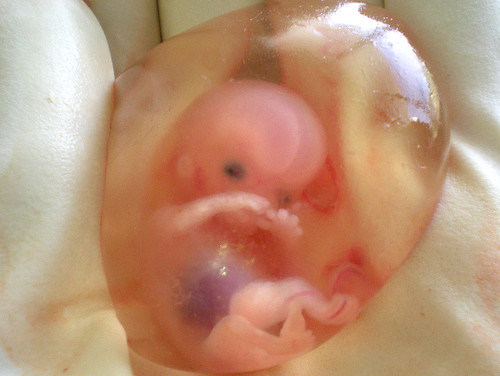We run our website the way we wished the whole internet worked: we provide high quality original content with no ads. We are funded solely by your direct support. Please consider supporting this project.
Did Jesus Have Two Minds?
As I laid out in the previous post, I believe Jesus is fully God and fully human. The question is: How is this possible? How do we talk about the way that Jesus was fully God and fully man?
The Creed of Chalcedon (451) tries to answer the question this way:
We, then, following the holy Fathers, all with one consent, teach men to confess one and the same Son, our Lord Jesus Christ, … truly God and truly man, … to be acknowledged in two natures, inconfusedly, unchangeably, indivisibly, inseparably; the distinction of natures being by no means taken away by the union, but rather the property of each nature being preserved, and concurring in one Person and one Subsistence, not parted or divided into two persons…
While the Creed defends against basic Christological heresies of the early Church, it actually does not answer our question. It just sets the boundaries that must be observed to avoid heresy. We must still make sense of the incarnation within these boundaries.
The way most theologians in the church tradition have done this, at least as it concerns the question of Jesus’ knowledge, is often called a “two minds Christology.” This view holds that Jesus walked the earth with both the all-knowing mind of God and the limited knowledge of a human being. And one could argue that the Bible supports this claim. Jesus occasionally demonstrated an omniscient awareness of people’s innermost thoughts and motives (Jn 2:24-25; Mt 9:4). He expressed a divine knowledge of Judas’ deceitful heart and future betrayal (Jn 13:18-19, 21-27), of Peter’s future denial (Lk 22L31-34) and the exact mode of his death (Jn 21:18-19), of a stranger who would open up his house to him and his disciples (Mk 14:12-16), and of a coin that would be found in a fish’s mouth (Mt 17:24-27). At the same time, as a full human being, Jesus often indicates that his knowledge was limited. So, this tradition concludes, Jesus somehow simultaneously possessed “two minds”: a divine omniscient mind and a human finite mind.
This view is not without its problems. To be honest, I have always had trouble rendering this view coherent. It requires us to imagine that Jesus was aware of what was happening with every molecule on every planet in the universe even while he was a zygote in the womb of Mary. And it requires that we imagine this while also affirming that, as a fully human zygote, Jesus was completely devoid of any awareness. Is this a legitimate paradox or an unacceptable contradiction? One could easily argue the latter. If being God means that one is omniscient and that being human means that one is not omniscient, then it seems we are asserting A and not A in claiming Jesus was both. We could argue along the same lines regarding God’s omnipresence and omnipotence. And if this is true, then in asserting that Jesus was a single person who was fully God (and thus fully omniscient) and full human (and thus not fully omniscient), we are asserting nothing, just as when we say “married bachelor” or “round triangle.”
There is an alternative way of talking about how Jesus was fully God and fully human, however. It has been labeled the “kenotic Christology,” based on the word kenosis, which is Greek for “to empty.” More specifically, it is based on Philippians 2:7. In my next post, I’ll begin with a discussion of this passage.
If you want to read a basic introduction to the Classical view of the Incarnation, I recommend G. Boyd, P. Eddy, Across the Spectrum, (Grand Rapids, MI: Baker Academic, 2009), 111.
Category: Essays
Tags: Essay, God, Incarnation, Jesus, Kenosis, Omniscience, The Mind
Topics: Christology
Related Reading

One Word
While I’ve lately been pretty distracted finishing up Benefit of the Doubt (Baker, 2013), my goal is to sprinkle in posts that comment on the distinctive commitments of ReKnew a couple of times a week. I’m presently sharing some thoughts on the second conviction of ReKnew, which is that Jesus Christ is the full and…

Satan and the Corruption of Nature: Seven Arguments
Man…trusted God was love indeed And love Creation’s final law – Tho’ Nature, red in tooth and claw With ravine, shrek’d against his creed” —Tennyson, In Memoriam Tennyson nailed it. We trust that God is love, but we also believe that God is the Creator of nature, and nature simply does not seem to point…

Neo-Molinism and the Infinite Intelligence of God
Classical Molinism holds that, since God is omniscient and knows all truths, he knows not only what every agent will do in the future, but also what every agent would have done in every other “possible world.” In this essay I argue that classical Molinism overlooked a whole category of truths that an omniscient God…

Overemphasizing Christ?
In response to my work, some have argued that I tend to overemphasize Christ. In light of the claim that in Jesus we have the one and only definitive Word of God and that no previous revelation should ever be placed alongside him or allowed to qualify what he reveals about God, some allege that…

What Does it Mean to be “Holy”?
Image by much0 via Flickr People today frequently associate the word “holy” with a list “do’s” and “don’ts” that “godly” people are supposed to adhere to. The concept of “holiness” in the Bible, however, is not primary about behavior. It rather refers to something that is unique and set apart from more common things. God is…

Jesus, the Light that Blesses
God spoke a promise to Abraham in Genesis 12 that his descendants would be a great nation and that all of the nations would be blessed through him. In this sermon clip, Greg discusses how Jesus became the new Israel that would bring a blessing to all people. You can find the full sermon as well…

